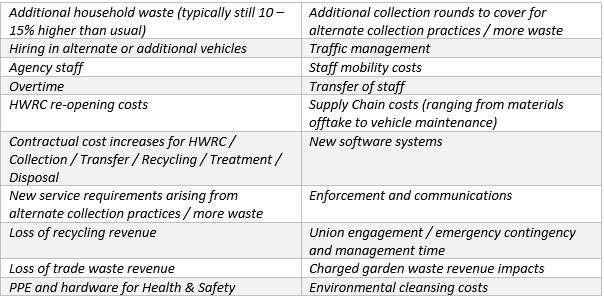The shock of the pandemic on municipal waste services was and is far reaching and covers a range of impacts. It is reported that 9 out of 10 Unitary Authorities are projected to overspend on budgets this financial year, and one key element of this additional cost burden is waste services. Example impacts we have come across include:-

The Government needs to further support Local Authorities including Unitary Authorities, with targeted financial support to address the unprecedented shocks to the waste service requirements. £1bn additional budget for ‘essential services’ was announced by the Government yesterday, and the detail and allocation of this remains to be seen. However, there may be more structural service and infrastructure aspects to address to support cost savings and recover and manage costs burdens moving forward.
Key areas we have experienced recently:-
• Renegotiate – this pandemic unfortunately doesn’t seem to be ending soon. Services may need to operate in a similar fashion to the last three to five months at least through the winter and maybe beyond. The delivery of relevant service contracts (collection / treatment etc.) should reflect this and set reasonable parameters to accommodate this situation. Amending contracts to adequately reflect the operating reality can save money and time for both contractors and the client.
• Restructure – where significant savings are required, substantial change is also usually necessary. This may mean playing to the Council strengths in Governance and situation. Where there is little competition, for example due to available infrastructure, then outsourcing may yield poor value. When the market is competitive, consulting with contractors in advance and structuring a procurement to realise strong value and deliverables is essential. This will be a factor of the specification, performance and payment mechanisms – bringing the best of public / private aspects into service delivery. Other elements of restructuring may include looking across, for example, the range of environmental services from collection, cleansing, grounds, trade, bulky to consider contingency ‘in the round’ and also the ancillary supply chains in order to maintain a robust set of service delivery arrangements. Joint contracts with adjacent / strategic authorities can also deliver economies of scale and efficiencies in contract management, procurement and service delivery.
• Reconfigure – there have been real financial wins in the sector in recent years. Those Councils that charge for garden waste collections for example would seldom regret that decision and this yields a £500k - £1m+ annual revenue stream into the service. Specific charges at HWRCs or via commercial waste transfer can also bring in revenue. Savings on residual or dry recycling collection or organic waste treatment contracts are other areas that can yield substantial efficiencies. Changes bring risks: political and financial. Take an expansion of trade waste collections for example, it can provide a valuable service to businesses, a new revenue stream - where it reaches economic efficient levels, but would have been hit by Covid-19 and the lockdown. However in that context it would offer more capacity to the household collection service, offsetting the costs of hiring in new vehicles - more Council capacity (including from streets and grounds services) can add to overall robustness and contingency without incurring potentially punitive supply / demand private sector costs.
• Invest to Save [So it doesn’t begin with ‘Re’ like the others, but very little is consistent or predictable these days, so this blog is simply keeping up the theme!] - One option, even when revenue budgets are constrained, may be the potential for capital investments to reduce overall operating and service costs in the long term. Not only that, there are new requirements that may require additional investment in areas of collection, depots, recycling and treatment. Over the last two years this area has seen the more ambitious waste management developments covering: infrastructure; joint ventures, and; new areas of in-house Services and Works contracts.
We are in a type of waste management service interregnum, and alternate plans, contingencies and efficiencies are key to minimising outlay whilst meeting service demands.
Frith Resource Management are specialists in Municipal Waste Management services, procurement and modelling. We have worked with over 50 local authorities and all client feedback has said they would recommend us to others, and we ask everyone! Call for a free discussion if you need some technical support on 01746 552423 or email paul@frithrm.com
More info on our website www.frithrm.com













